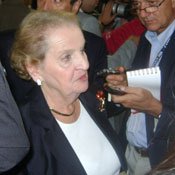Former U.S. Secretary of State Madeleine Albright took questions from reporters, including the Jackson Free Press, after Friday's presidential debate. Here's what she had to say:
Did Obama show he had enough experience to rival John McCain?
Absolutely. And not only did he show that he had the experience, he had the judgment and the wisdom. And for me, as somebody who is approximately McCain's age, what Obama showed me was that he can think ahead; that he is thoughtful, creative; that he is someone that understands the complexities of the issues; that is not looking backward. We are in the 21st century, and he is looking at issues from that perspective and not the 20th century. So for me, this was theoretically, people said, McCain's groundnational securitybut I think Obama showed that he not only understands the issues, but can push forward in terms of solutions that can integrate domestic and foreign policy. He is the right person for where we are at this point: a very difficult and complicated time.
Did John McCain surprise you at any time?
Well, I think he's a likable person. But what surprised me was that he kind of kept sticking back on certain points that he wanted to make and criticizing certain things in Obama's record that just weren't true. And he was kind of sent to do that. And he really spent so much time looking backward. If I had been advising him, I would say, "Think forward: Do what is going to happen next, not what you've done in the past." People know that he's been a military person, but what they don't know is how he looks to the future problems. And that's what Obama was able to show us and McCain wasn't.
What were the political costs of McCain almost stalling the debate?
I think that it was so weird, frankly. I think it showed impulsiveness on his part. It also showed something else: that he's not somebody who thinks that a president can do more than one thing at a time. Having worked for two presidents, I can assure you that you don't have the luxury of working on just one problem. His going to Washington, from what I could tell, hasn't made any difference. I think tonight the economic questions, the way both candidates handled that, showed why it's important to have a debate.
Was Obama put on the defensive during the debate?
I didn't think so. I think that what he did, which is very important, is if the other candidate starts saying something about your record that isn't true, you have to correct them right away. That's the problem. And McCain was throwing out facts about pieces of votes or various committee actions that were just wrong, and I think that if Obama had let them stand, then there would be days of "What was really the story?" I think he was able to push back on it.
Do you think McCain was edgy in insisting that Obama doesn't get it?
I think that he made up his mind that he was going to do that on every single question. It stopped him from answering, or for me, it stopped him from thinking forward, because he kept saying "you did this, and you did that."
Who was right about Henry Kissinger's stance on talks without preconditions?
[W]e all five, all five former secretaries of state, agreed that it was important to talk to Iran. We had some questions as to what level. Secretary Kissinger was the one who said it should be at the highest level, the secretary of state level. We all agreed on that the fact that there should be no preconditions. We all agreed that there should be preparations ... the bottom line is that talking is not always loving. You basically deliver some tough messages, and you can't do it without talking to them. I spoke about my own experiences with Kim Jong Il. I'm sure he didn't think we were having a pleasant conversation.



Comments
Use the comment form below to begin a discussion about this content.
comments powered by Disqus